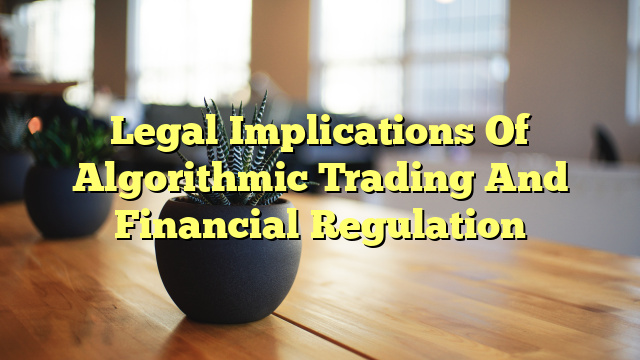Table of Contents
- What Regulations Apply to Algorithmic Trading?
- Is it Legal to Use Algorithmic Trading?
- What are the Issues with Algorithmic Trading?
- What are the Real Effects of Algorithmic Trading?
What Regulations Apply to Algorithmic Trading?
Algorithmic trading is subject to the same regulations as any other type of trading. All financial trades are subject to certain regulations, such as the Securities and Exchange Commission (SEC) and the Financial Industry Regulatory Authority (FINRA). The regulations are designed to protect investors from fraud and to ensure fair and orderly markets in which all participants have the same information.
In addition to the regulations governing all trades, the SEC and FINRA have issued regulations specifically targeting high frequency traders (HFTs). These regulations include requirements for HFTs to register with the SEC and FINRA, to maintain records of their trading activities, and to disclose certain material information to the public. The regulations also require firms that provide algorithmic trading services to register with the SEC and FINRA as “broker-dealers”.
Is it Legal to Use Algorithmic Trading?
Yes, it is legal to use algorithmic trading provided that the trading activities are conducted within the bounds of the applicable regulations. Algorithmic trading is not inherently illegal or unethical, but it is illegal to engage in algorithmic trading activities that are in violation of the applicable regulations.
What are the Issues with Algorithmic Trading?
Algorithmic trading has the potential to cause market disruptions if not properly regulated. For example, HFTs can trade faster than human traders, leading to a situation where HFTs can quickly “front run” orders and take advantage of slower traders who may not have access to the same data or technology.
Also, algorithmic trading can lead to a “flash crash” in which prices drop very quickly due to rapid and simultaneous sell orders triggered by a single event. This can lead to a cascade of selling that results in a sharp drop in prices. Flash crashes can cause significant losses for investors and can also damage investor confidence in the markets.
What are the Real Effects of Algorithmic Trading?
The real effects of algorithmic trading are difficult to measure, as the overall impact is difficult to quantify. However, it is widely accepted that algorithmic trading has had a significant impact on the markets, as it has enabled traders to take advantage of more opportunities and to execute orders much faster than was possible before.
Algorithmic trading has also led to increased liquidity in the markets, as more traders are able to enter and exit positions quickly. This increased liquidity has resulted in lower transaction costs and tighter spreads, which is beneficial to all market participants.
Finally, algorithmic trading has helped to reduce market volatility, as trades are executed quickly and with less emotion. This reduces the risks associated with market volatility and helps to stabilize prices.


Algorithmic trading brings a unique set of legal and regulatory challenges. As governments consider stronger regulations, considering new approaches like algorithmic self-compliance could help.
Algorithmic trading should be regulated to help prevent legal implications in financial markets.